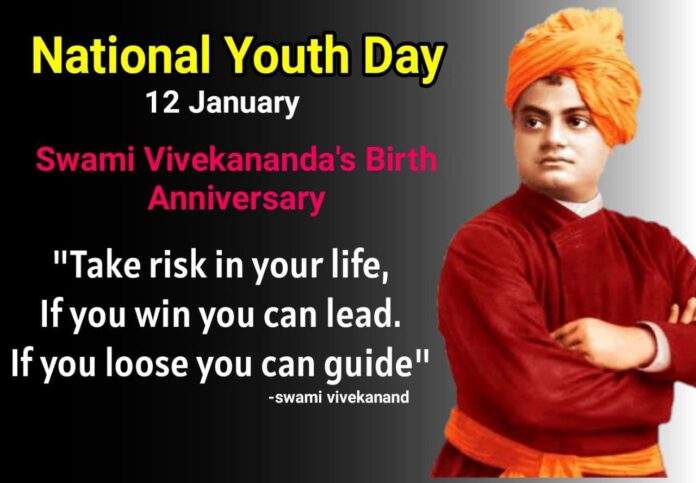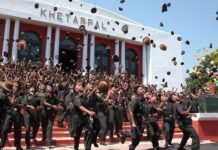Swami Vivekanand on his 159th birth anniversary. He was greatly influenced by his mother’s religious beliefs. The Birth anniversary of Swami Vivekananda is celebrated as National Youth Day to honour Swami Vivekananda. It also marks this ideas on how the young should participate in the modern world while upholding their values. The Indian Hindu monk Swami Vivekananda was a great thinker, philosopher and a social reformer.
He contributed significantly in taking the country and society towards a new and developing direction. He was the believers of youth power and was an fervent disciple of Sri Ramakrishna Paramahansa.
History and Significance
The ideas of Swami Vivekanand are still valid during current times and can guide the youth for their future. He always explained how youth can recognize their potential and voice their opinions. His inspirational speeches helped the youths to fight against the British and fight for independence.
Swami Vivekanand was called the “National Saint of India”. He said if a person can attain almost anything if he dares to see beyond what it is and what he desires to become. Because of Swami Vivekanand’s passion for youth development, it is significant to celebrate national youth day on his birthday.
About Vivekananda
He was born in Kolkata on 12 January 1863 to Vishwanath Datta and Bhuvaneshwari Devi. His father was a successful attorney. He used to practice meditation even from his boyhood, and was associated with Brahmo Movement for some time.
At the threshold of youth Narendra had to pass through a period of spiritual crisis when he was assailed by doubts about the existence of God. In November 1881, Narendra went to meet Sri Ramakrishna who was staying at the Kali Temple in Dakshineshwar. Narendra became a frequent visitor to Dakshineshwar and under the guidance of the Sri Ramakrishna, he made rapid strides on the spiritual path.
After a few years two events took place which caused Narendra considerable distress, sudden death of his father in 1884 and Sri Ramakrishna in 1886. In the middle of 1890, Vivekananda left Baranagar Math and embarked on a long journey to explore and discover India. He went on a pilgrimage all over the country, studying the conditions of the people. Wherever he went, his magnetic personality created a great impression.
He decided to attend the World Parliament of Religions in order to spread his message in the West which was schedule to be held in Chicago in 1893. On the eve of his departure, he adopted the name of Swami Vivekananda. His speeches at the World’s Parliament of Religions held in September 1893 made him famous as an ‘orator by divine right’ and as a ‘Messenger of Indian wisdom to the Western world’. For three years he spread the Vedanta philosophy and religion in America and England and then returned to India. He found the Ramakrishna Math and Mission on 1 May 1897. In 1898, he established Belur Math.
In June 1899 he leaves India for second visit to the West. He returned to Belur Math in December 1900. The rest of his life was spent in India, inspiring and guiding people. He has dedicated his life to guiding others for pure and true spiritual path. His health deteriorated and Swami Vivekananda breathed his last on 4 July 1902 at the Belur Math, leaving behind an immortal legacy not just in the hearts of his contemporaries, but for all generations to come.
On his birth anniversary, we look back at the quotes and teachings of Swami Vivekanand that still continue to inspire everyone to work towards a meaningful life.
– Learn everything that is good from others, but bring it in, and in your own way adsorb it; do not become others
– Experience is the only teacher we have. We may talk and reason all our lives, but we shall not understand a word of truth
– Arise awake and stop not until the goal is achieved
– We are what our thoughts have made us; So take care about what you think. Words are secondary. Thoughts live; They travel far.
– Neither money pays, nor name, nor fame, nor learning; it is Character that cleave through adamantine walls of difficulties










